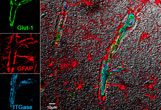 |
The Tulane National Primate Research Center is involved in a variety of important multidisciplinary projects focusing on areas of biomedical research with high priority concerns for human health. This section, which is intended for the interested researcher, scientist or investigator, provides information on those research programs and projects. The functions of each research program and project are discussed within the parameters of each division’s research, research resources and educational and training opportunities. You will note that many of the Research Programs are collaborative involving more than a single research division.
Bacteriology & Parasitology – The Division of Bacteriology & Parasitology encompasses research, training and service on features of the pathogenesis, diagnosis, treatment, transmission, and prevention of bacterial and parasitic diseases. Find out more...
Comparative Pathology – The Division of Comparative Pathology conducts tissue-based studies of disease processes with the major focus on infectious diseases including AIDS, malaria and tuberculosis. Find out more...
Regenerative Medicine – The Division of Regenerative Medicine conducts research that utilizes vector-based gene therapies and cell-based interventions for genetic and acquired diseases. Find out more...
Immunology– The Division of Immunology conducts basic and applied immunology studies of disease processes with a focus on infectious diseases such as AIDS, Lyme disease and Rickettsia. Find out more...
Microbiology – The Division of Microbiology conducts basic infectious disease research using nonhuman primate models of human disease with an emphasis on AIDS, microsporidial infections, vaccine development and retrovirology. Find out more...
Veterinary Medicine – The Division of Veterinary Medicine is responsible for all aspects of care, husbandry and management of the animal colonies. This responsibility includes the provision of clinical veterinary medical care, development and implementation of the nonhuman primate enrichment program, maintenance and development of the animal records database, research support, and collection of biological specimens. Find out more...
|
 |

